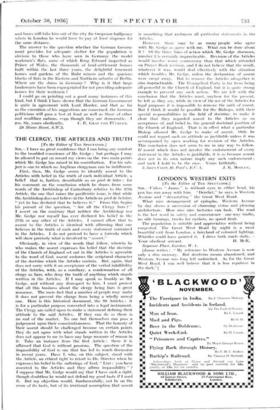THE CLERGY, THE ARTICLES AND TRUTH
[To the Editor of THE SPECTATOR.] S1R,—I have no great confidence that I can bring any comfort to the troubled conscience of Mr. Gedge ; but perhaps I may be allowed to put on record my views on the two main points which Mr. Gedge has raised in his contribution. For his sub- ject is one to which no Anglican clergyman can be indifferent.
First, then, Mr. Gedge seems to identify assent to the Articles with belief in the troth of each individual Article, a belief that is, further, describable as au pied de lettre : for his comment on the conclusion which he draws from some words of the Archbishop of Canterbury relative to the 37th Article, the one that raises the pacificistic issue, is that while the Archbishop does not beliere in the Articleau pied de la lettre, "yet he has declared that he believes it." From this begins his pursuit of the question, " Are aft the Clergy liars ? " I assert on the contrary that neither the Archbishop nor Mr. Gedge nor myself has ever declared his belief in the 37th or any other of the Articles. I cannot allow that to assent to the Articles is identical with affirming that one believes in the truth of each and every statement contained in the Articles. I do, not pretend to have a formula which will show precisely what is involved in assent."
Obviously, in view of the words that follow, wherein he who makes the assent expresses his belief that the doctrine of the Church. of England set out in the Articles is agreeable to the word of God, assent endorses the scriptural character of the doctrine which the Articles contain. But, again, that does not carry with it an acceptance of the verbal infallibility of the Articles, with, as a corollary, a condemnation of all clergy as liars, who deny the truth of anything which stands written in the Articles. If I may speak as frankly as Mr. Gedge, and without any disrespect to him, I must protest that all this business about the clergy being liars is great nonsense. The mere fact that a number of people may make it does not prevent the charge from being a wholly unreal one. Here is this historical document, the 39 Articles : it is for a particular purpose converted into a legal instrument. The Clergy are called upon to make a statement defining their attitude to the said Articles. If they can do so there is an end of the matter. No one but themselves can pass a judgement upon their conseientionsness. That the honesty of their assent should be challenged because on certain points they do not agree with what stands written in the Articles does not appear to me to have any large measure of reason in it. Take an instance from the first Article : there it is affirmed that God is without passions. The question of the impassibility of God is one that has to much discussion in recent years. Have I, who, on this subject; stand with the Article, an ethical right to retort to Dr. Streeter when he expresses his belief in the sufferings of God, " Liar : you have assented to the Articles and they affirm impassibility " ? I suppose that Mr. Ledge would say that I have such a right, though doubtless he would not defend my good taste if I used it. But my objection would, fundamentally, not be on the score of its taste, but of its irrational assumption that assent is something that embraces all particular statements in the Arf icles.
However, there may he its many people who agree with Mr. Gedge as agree with me. What can be done about it ? Of the three lines of action which Mr. ('.edge discusses, number 2 is certainly impracticable. Revision of the Articles would involve worse controversy than that which attended on Prayer Book revision, and I do not believe that the result, whatever it was. would deal effectively with the situation which troubles Mr. Gedge, unless the declaration of assent were swept away. But to remove the Articles altogether is also impracticable. The Evangelical Party is far from being aff-powerful in the Church of England, but it is quite strong enough to prevent any such action. We are left with the conclusion that the Articles must., anyhow for the present, be left as they are, while in view of the use of the Articles for legal purposes it is impassible to remove the oath of assent. But I think it would be possible for the Bishops, with their special responsibilities in the field of doctrine, to make it clear that they regarded assent to the Articles as an acceptance of, and belief in, the general doctrinal position of the Church of England. That is in effect what a particular Bishop allowed Mr. Gedge to make of assent. Only he could not regard such an attitude as justifiable unless it was accompanied by open working for revision of the Articles. This conclusion does not seem to me in any way to follow. If assent which does not involve the endorsement of every statement in the Articles is justifiable, it is so because assent does not in its own nature imply any such endorsement : and such I hold to be the case.----Yours faithfully, 3 Amen Court, St. E.C. 4. J. K. Mort.elr.




















































 Previous page
Previous page